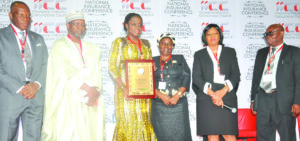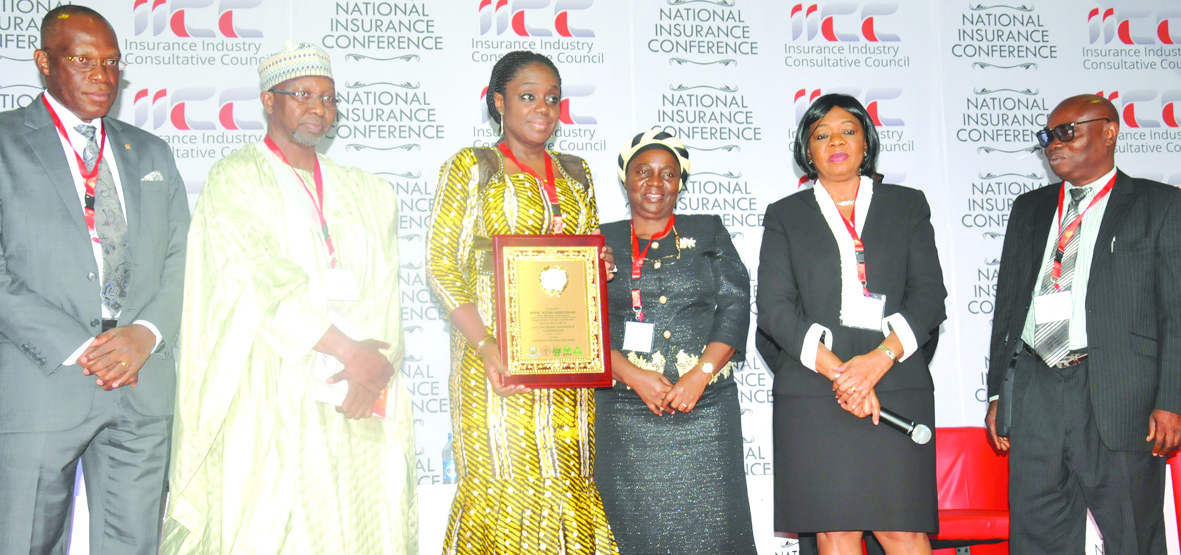
The Minister of Finance, Mrs Kemi Adeosun reiterates the interest of the Federal Government towards initiating reforms that would build a more vibrant insurance industry
The Minister of Finance, Mrs Kemi Adeosun has expressed the determination of the present administration to lead in the reforms of a more vibrant Nigerian insurance market.
Adeosun is optimistic that a developed and active insurance market would bring about increase in the country’s gross domestic product (GDP), accumulation of long-term funds for infrastructural financing, job creation, and an improved standard of living. The development, she added, would attract foreign investment into the country.
On the ongoing efforts of industry stakeholders to reposition the insurance industry for growth, the minister assured that the Federal Government was ready to lend its support. “There is a need to immediately address the decline in the Nigerian insurance industry as it is lagging behind global and African peers. Despite being the largest economy in Africa, the Nigerian insurance industry remains largely underdeveloped. The industry has under-performed the banking sector and even the recently established pensions sector,” Adeosun said.
Emphasising the resolve of the Federal Government to stimulate extra-ordinary growth and unleash the potential of the insurance industry in Nigeria, the minister listed some factors necessary for the change. These, among others, include the need to recognise the true stage of development of the industry in Nigeria. She noted that despite the age of the country’s insurance industry, it remains in its infancy. According to her, this means that government must act as a nurturer and incubator of the industry. “We have also seen the success of the pension fund industry as a text book example of where government policy set clear parameters for participation, led by example and enforced legal obligations. If we are to use the Pension fund success story as a template for the insurance industry, then we can jointly identify the required road map,” she said.
She also stressed the need to strengthen the capital base of insurance companies. She recalled that in 1981, the minimum capital requirement for banks was N1million while that of composite insurance companies was N0.8 million. By 2014, banks had grown theirs to N25 billion and Composite Insurance Companies to N5billion, showing that banks had grown capital requirements 8x faster. The industry needs to recapitalise. Capital levels were last raised in 2007. To take true advantage of the opportunity for the industry, she said, “we must recapitalise and reposition. The top three banks have capital in excess of N300 billion each. The top three insurers have capital of between N14 billion to N25 billion.”
According to her, the insurance sector needs to raise minimum capital requirements in a manner that is comparative to what happened to the banking sector in the last two to three decades. “Increased capital will provide funding for publicity and product development. It will raise the clout of insurance companies in policy formulation and will enhance our capacity to hire the best people and deploy the technology and marketing, product awareness and investment needed to support the industry,” Adeosun said.
The Muhammadu Buhari administration, she said, firmly believes that the economy has only one direction to move in and that is upwards as true change means doing things differently with the full expectation of different outcomes. “Our confidence in the future of our economy is not based on the statistics that have consistently detailed its potential but rather the deliberate policies and actions that will ensure a robust and sustainable recovery. Our economic focus is built on pursuing a disciplined approach to our financial management, reducing the cost of governance and increasing its impact. This is being attained by efforts to maximise revenues and minimise leakages through corruption, waste and inefficiency. This will release the headroom needed to fund our essential infrastructure, which will in turn lead to the increased growth of the non-oil sector and a more diversified revenue base,” she said.
The days of Nigeria’s reliance on oil as a principal source of revenue, she advised, must be put firmly in the nation’s economic history. “That process of adjustment is painful but, like a good medicine, it is the only effective cure,” she added.
She said a key element of the enabling environment is the de-risking provided by the insurance industry. Quoting Nigeria Insurance Association (NIA) sources, Adeosun said that Nigeria with a penetration of 0.3 percent recorded total industry Gross Written Premium (GPW) of N350 billion in 2015. “If we collectively set a 7-year target of achieving Africa’s average penetration of 3.5 percent, we can transform our industry into one with GWP of N4.5 trillion by 2023.” To achieve this, she added, the industry will have to grow at a Compound Annual Growth Rate (CAGR) of 44 percent from 2017 to 2023. “This is in no way an impossible target and in fact represents the type of ambitious objectives we need to set for ourselves as several sectors in Nigeria including Telecoms, Banking and Pensions Management have been able to record such impressive growth through the collective support of all stakeholders. It is also consistent with the Change mandate of His Excellency President Muhammadu Buhari. We have no reason to be different,” she said.
Adeosun reiterated the need to act urgently, as the development of the Nigerian insurance industry will come with other attendant benefits that are critical to achieve the type of growth and change for the economy and for the large number of Nigerians who have been deprived of the financial stability, protection and business growth that developed insurance markets have provided for their citizens for centuries. All successful economies are characterized by a strong investment culture of which insurance plays a key role.
Mohammed Kari, Commissioner for Insurance, National Insurance Commission (NAICOM) said that the commission has tackled the immediate issues challenging the industry. “The Commission has continued to provide regulatory oversight for the industry in relevant areas through the issuance of guidelines, training and the creation of the enabling regulations to introduce new classes of insurance (products) to address the financially disadvantaged in our society,” he said.
To address the medium and long term challenges of penetration, Kari disclosed, the commission is on the verge of re-launching the Market Development and Restructuring Initiative (MDRI). “The initiative originally launched in 2009 is being reviewed for the immediate impact we believe it will provide. We believe, if properly implemented, it will bring the desired results as envisaged,” he said.
He added that the industry has also resolved to rebrand itself and create more distribution channels.


